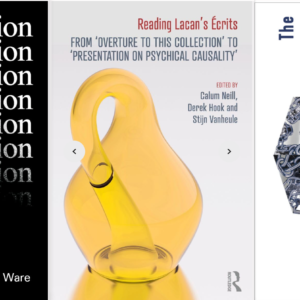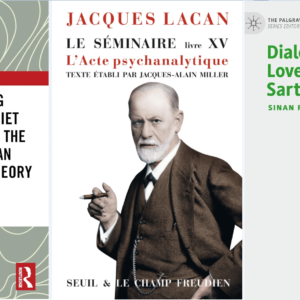News – July 2015
Proposals are now being welcomed for contributions to a planned new collection from Palgrave Macmillan under the title The Palgrave Lacan Series. Co-ordinated by Lacanian scholars Calum Neill at Edinburgh Napier University and Derek Hook at Duquesne University, the book series will bring together the best new writing in the Lacanian field, giving voice to the leading writers of a new generation of Lacanian thought. The series will comprise original monographs and thematic, multi-authored collections. The books in the series will explore aspects of Lacan’s theory from new perspectives and with original insights. Prospective authors interested in contributing should get in touch with Calum Neill to submit proposals for monographs or mini-monographs for the series.
The thirteenth annual conference of Affiliated Psychoanalytic Workgroups, “On Transference”, will be held Friday to Sunday, 21-23 August at Ghent University, Belgium. Register online here. Keynote speakers will be Kazushige Shingu and Paul Verhaeghe. Bruce Fink will also be there to discuss his new translation of Seminar VIII on Transference, which is due to be released in October and can be pre-ordered now.
A full calendar of events for the next academic year from the Irish Circle of the Lacanian Orientation has been released. View it here. It starts on 12th September with a free Open Day on the question “How does one become an analyst”. A series of four seminars focussed on the theme of the next World Association of Psychoanalysis Congress in 2016 – “Language and the Body” – will follow, together with reading seminars and sessions dedicated to the work produced through the WAP’s cartels. Check out the ICLO-NLS site for more.
Adrian Price’s seminar to the ICLO-NLS from last December is now available on Radio Lacan in three parts. Its title – “The Invocatory Drive. From a Still Small Voice to the Scream of Nature” – is taken from the Book of Kings in the Bible. Price’s translation of Seminar X has recently been released, but the reading that he presents in this talk extends to, and links, Lacan’s comments on the voice in Seminar X on anxiety to those in Seminar XI on the four fundamental concepts of psychoanalysis. Price’s talk is of special interest for reflecting on some of the lesser-known intricacies of Seminar X, including Lacan’s discussion of Euler circles, so-called ‘rim phenomena’, and the presentation of the object as amboceptor. Listen to the talk here.
Staying with the topic of Seminar X, an excellent article by Melbourne-based analyst David Ferraro, adapted from his presentation delivered last month at the Lacan Circle of Melbourne, is available on his site here. It serves as an introduction to Lacan’s ideas on anxiety from Seminar X as Ferraro skilfully links Lacan’s work at this time to nascent concepts like object a and the development of the fantasy; and to Freud’s work on the uncanny, which Lacan comments on at length in Seminar X.
Also in Melbourne, the Lacan Circle of Melbourne will be hosting a two-day seminar with Véronique Voruz on 22nd and 23rd August on The Act in Psychoanalysis. A synopsis of her talks and details of how to register can be found here.
Anouchka Grose’s recent talk at the Freud Museum – “The Unconscious from Freud to Lacan” – is now available as a podcast. The talk was given on 14th July as part of the Museum’s Festival of the Unconscious, which runs until 4th October. Grose’s presentation draws on material from her chapter of the same name in last year’s Introductory Lectures on Lacan, a collection from the Centre for Freudian Analysis and Research, of which Grose is a member.
Two recordings of recent talks in London which might be of interest to Lacanians have been made available thanks to the brilliant Backdoor Broadcasting Company. First is Alenka Zupančič’s talk at Kingston University in May entitled ‘Power in the Closet (And Its Coming Out)’. Zupančič’s orientation is Lacanian and readers may know some of her work for the interface between Lacan and other philosophers it often presents. These include her book Ethics of the Real and several articles freely available online, such as this one on surplus value and surplus enjoyment. Second is the debate which followed the Critical Theory Summer School’s annual event from 10th July, featuring names well-known within the Lacanian field such as Jacqueline Rose, Slavoj Zizek, and Stephen Frosh.
Many thanks to Richard G. Klein in New York for completing his bilingual text of Freud’s ‘On Dreams’ in July. This follows his bilingual version of The Interpretation of Dreams which he produced in 2001 (links to which are on the homepage of his site, Freud2Lacan.com). In the preface to his transcription, Klein makes an interesting discovery which points to an inconsistency in Strachey’s original English translation:
In the Gesammelte Werke Freud uses something called Sperrdruck (spaced letters), which German speaking authors used in the time of Freud instead of italics. That is, the word that they wanted to emphasize was spelled with a space between each letter. An example of this -.the word for ‘condensation (Verdichtung)’ in the German text using Sperrdruck would be ‘V e rd I c h t u n g’. The use of Sperrdruck appears on almost every page of Freud’s Gesammelte Werke. The strange thing is that Strachey sometimes takes note of it, by using italics for the English translation of the word in Sperrdruck, sometimes he just puts quotes around it, without using italics and sometimes he ignores the use of Sperrdruck altogether.Then his English translation has no indication whatsoever that Freud meant to emphasize that word. You will be able to spot the many times Strachey does this using this bilingual. It is a bit shocking really.
Klein has also helpfully pointed out that Freud’s complete work is available in German – the Gesammelte Werken – as a downloadable (and therefore searchable) PDF, thanks to Freud-Online.de. Here’s the link.
Finally, for French speakers a new edition published last month under the editorship of Fabian Fajnwacks and Clotilde Leguil, and featuring familiar Lacanian names such as Éric Laurent and Pierre-Gilles Guéguen, is likely to be of interest. Entitled Subversion lacanienne des théories du genre it looks at how Lacanian psychoanalysis can approach the issue of gender, whether it is heteronormative, and what status the signifier ‘woman’ has in psychoanalysis. The book can be ordered from the École de la Cause freudienne’s shop here.
Got news? Get in touch.




Leave a Reply